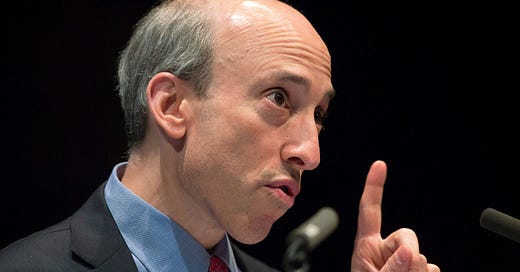Like all regulatory agencies the SEC has an agenda, which changes with the change in administrations following elections. Under President Trump the SEC’s agenda was oriented toward the deregulation of financial institutions and markets and under President Biden it will likely be oriented to re-regulation in some areas. But what exactly is the SEC focused on today?
The new head of the SEC is Gary Gensler, who has a very interesting background. He made his money as a partner at Goldman Sachs and then went into government service, like many other successful and public spirited Goldman executives. (During the financial crisis, the US Treasury under Hank Paulson was sometimes referred to as “Government Sachs”.) Gensler has worked in the US Treasury Department under President Clinton; under President Obama he chaired the CFTC, where he made major changes to the clearing procedures for swaps (a $400 trillion business); he has served as chair of the Maryland Consumer Protection agency; and he has taught finance at MIT, including a popular class on crypto-currencies (no doubt the first SEC head to do so). And now he is chair of the SEC, and a very well qualified one indeed.
Mr. Gensler has identified a number of specific areas of concern which the SEC is now looking into, and we should expect to see proposed rule-making over the coming months. I have identified five broad subject areas that I find interesting and will be following (and likely posting about) subsequently. These are:
Payment for Order Flow (PFOF). I have written about this before in my various Robinhood posts. PFOF is an area of concern for the SEC because of the inherent conflict of interest between the high frequency trading firms that execute retail customer orders (Citadel et al) on behalf of the discount brokerage firms (eg Robinhood) and the brokerage firm customers themselves, who generally don’t pay commissions but who may or may not be getting good execution on their orders. Gensler has said that he is “open” to the possibility of banning PFOF, but any such move will be strongly resisted by the brokerage industry and in my view is unlikely to be implemented. The amount of money at stake for firms like Robinhood is small relative to the size of customer transactions, but large relative to the firms’ current profitability. This will be worth watching.
Robo-advisors. The investment management industry is under pressure from a number of fronts, including the rapidly increasing use of technology to disintermediate human investment advisors. This may well be a good thing, on balance, but not everyone will be well served by so-called “robs-advisors”. I don’t yet know much about this subject, but the SEC is on the case and I look forward to learning more.
ESG Funds. Investment funds with an ESG (Environmental, Social, Governance) focus are all the rage these days, but I think it is fair to say that ESG fund formation and capital raising has outpaced investor understanding. In today’s environment, it is very difficult for investors to know exactly what they are getting when they buy an ESG-labeled fund. The SEC wants to see more informative disclosure from new and existing ESG funds, but how this will play out is still unclear. Expect resistance from the industry, as always.
PE Fund Fees. In addition to “conflicts of interest” (see above), the SEC is very focused on the issue of “economic rents” (monopoly profits) generated by the securities industry and paid by their customers. The Private Equity industry may or may not be a good example of this, but the SEC seems to think it is. PE firms make a lot of money and the industry is dominated by just a handful of firms (Blackstone et al), so perhaps the SEC is on to something. But it is also true that the top PE firms are very competitive with one another in many respects, and their customers (investors) tend to be large and sophisticated institutions who are not shy about demanding lower fees and better performance. (PE management fees come down significantly over the years, even at the top firms.) The PE industry is also very aggressive on the lobbying front and is not shy about throwing its money around, so we can expect strong resistance to any regulatory move that threatens to take money out of the pockets of the PE firm partners. I don’t expect much to come of this particular initiative but I could well be wrong. What I would really like to see instead (or in addition) is for Congress to tackle the “carried interest” tax loophole, which many think is unjustifiable and long overdue for correction.
Crypto-currencies. There is a lot happening in crypto land, most of which I do not understand. But I was encouraged to see the SEC take strong enforcement action against the Coinbase lending product, “Lend” (clever name). Really, Coinbase did not think this would be regulated by the SEC? Had they never heard of corporate bonds or margin loans? To learn more, read here.
As noted, I expect to write more in the future about some of these topics, so stay tuned. In the meantime you may wish to read more about SEC chair Gensler’s regulatory agenda, found here.



